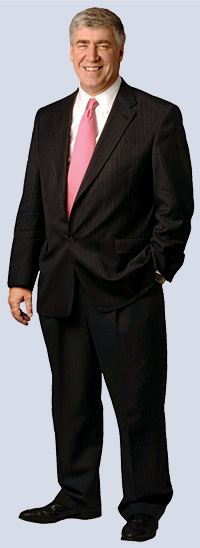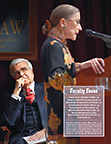Introducing Jeremy Waldron
University Professor
Printer Friendly Version For a scholar who’s been described as a dynamo, a live wire, an enormously energetic intellect, Professor Jeremy Waldron had a quite uneventful upbringing. He was raised in New Zealand’s Invercargill, a small city in a farming district—“the southernmost city in the British Empire!”—where his father, an Anglican clergyman, served in the same parish for Waldron’s entire childhood. Indeed, Waldron didn’t leave New Zealand until he was 25.
For a scholar who’s been described as a dynamo, a live wire, an enormously energetic intellect, Professor Jeremy Waldron had a quite uneventful upbringing. He was raised in New Zealand’s Invercargill, a small city in a farming district—“the southernmost city in the British Empire!”—where his father, an Anglican clergyman, served in the same parish for Waldron’s entire childhood. Indeed, Waldron didn’t leave New Zealand until he was 25.
But since then, Waldron, 52, often considered one of the world’s leading contemporary political philosophers, has rocketed through the academic world—to Oxford, to Edinburgh, to Berkeley, to Princeton, to Columbia, and now this fall, to NYU. “In the area of legal philosophy,” he says, “NYU has a hugely successful, vigorous intellectual community. In legal theory, it has people like Ronald Dworkin, Tom Nagel, Liam Murphy, Lewis Kornhauser, David Richards, Sam Issacharoff, David Garland, Philip Alston and my countryman Ben Kingsbury. It’s a very rich community.”
Waldron has visited the Law School before, presenting papers at the Colloquium in Legal, Political and Social Philosophy, run by Dworkin and Nagel. Indeed, his relationship with Dworkin dates back to Oxford, where Dworkin had been his academic adviser. But though they’ve remained close through the years, Waldron hasn’t always followed in his mentor’s footsteps. He wasn’t tempted by the world’s leading legal philosophy chairs that had been Dworkin’s—the Chair of Jurisprudence at Oxford and the Quain Professor of Jurisprudence at University College London. “He turned down two of my chairs, so I’m lucky he’s coming to NYU,” jokes Dworkin.
So, does Waldron’s much-heralded appointment mean he is finally set to inherit the unofficial mantle of the world’s top legal philosopher from Dworkin? Not according to Waldron. “I think that’s nonsense,” he says. “First of all, Dworkin shows no signs of giving away the mantle. And things don’t work like that. Everyone works in his own areas. People may use that phrase but it would be wrong.” Professor Liam Murphy agrees: “He doesn’t need to inherit Dworkin’s mantle. He’s famous in his own right.”
A lively, animated teacher, Waldron is a highly prolific writer of books and academic papers. “He’s not just writing more than some of us, he’s writing more than most of us!” Murphy says, laughing. Waldron, who made his mark at 35 in the area of property rights with the book The Right to Private Property, isn’t reticent about policy issues, either, taking strong, sometimes controversial stands on judicial review (should be weakened); torture as a way of eliciting information (should be banned absolutely); and multiculturalism (wrong and silly). His studies take him to the very center and convergence of political philosophy, legal philosophy and political theory. “I’m as comfortable teaching historical political theory—Locke, Hobbes, Aristotle—as I am teaching modern constitutional jurisprudence or as I am abstract political philosophy,” he says.
Even as a teenager, Waldron had an interest in law and history. He earned degrees in philosophy and law from New Zealand’s University of Otago, and went to Oxford in 1978 to do graduate work. He first read about Dworkin in a 1977 Time magazine profile drawn to his attention by his mentor and “philosophical godmother,” Professor Gwen Taylor of the University of Otago in New Zealand. She had written to H.L.A. Hart for advice on whom Waldron should study with at Oxford. Hart wasn’t taking new students but suggested Dworkin, and the relationship began. “He was very glamorous, quite intimidating intellectually, but a good person to work with,” Waldron recalls. Dworkin would, typically, shred Waldron’s papers—courteously, of course—and Waldron says he now owes a great debt to Dworkin for his rigorous workings-over. Dworkin, in turn, remembers Waldron then as “engaging, informal, funny, very fast and quick.”
From 1980 to 1982, Waldron was a fellow at Lincoln College, Oxford. Anxious to get on a tenure track, he decided to quit Oxford and go to the University of Edinburgh in Scotland. He stayed there until 1987, when he left for the Boalt Hall School of Law. Nearly 10 years later, he and his companion, Carol Sanger, then a law professor at Santa Clara Law School, were recruited separately by Columbia Law School. “I didn’t like New York so much, so I succumbed to an offer from Princeton and Carol accepted Columbia.” But he wasn’t happy at Princeton, and after just one year he moved to Columbia. He stayed for “a glorious nine years”—just last year he was named University Professor.
Waldron has several projects in the works, including collecting historical writings on the rule of law. That will be the topic for a course he will teach in the spring. This fall, he’ll help conduct the demanding Colloquium in Legal, Political and Social Philosophy with Nagel and Dworkin.
One thing Waldron will be doing less of this year is administrative work. He ran a center on law and philosophy at Columbia and chaired the University Senate Committee on Libraries and IT there. He says that he won’t miss the grinding committee work and that he’s happy that he will be able to partake of the classical music, opera and travel that he loves. But also, he says, his new schedule will give him more time to focus—“on the core activity of teaching and writing.
—
